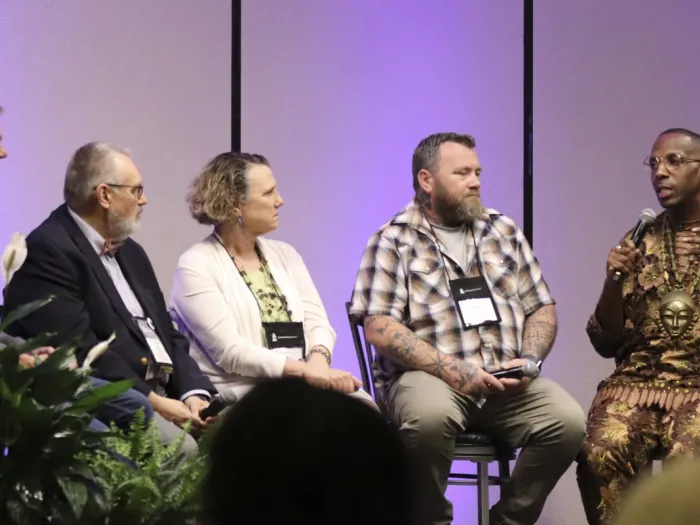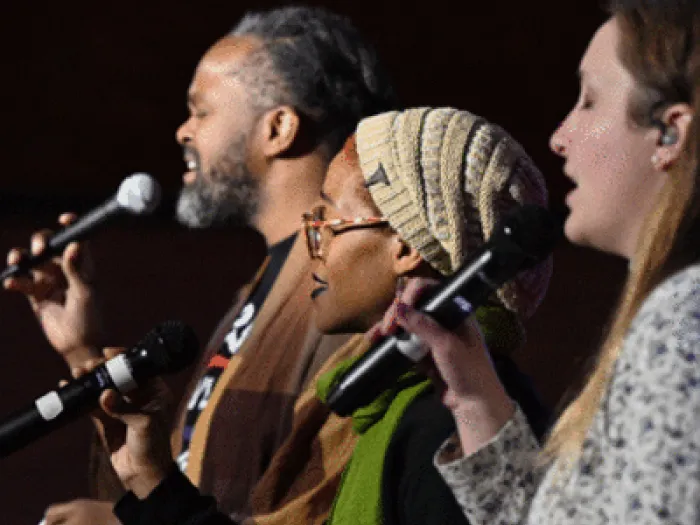Presbyterian Mission Agency Board votes to create a task force to study clergy pay equity, staffing barriers for small congregations
The task force will also look for ways to bring pastoral leadership to more faith communities of color


LOUISVILLE — With two members in dissent, the Presbyterian Mission Agency Board voted Friday to appoint a three-member task force to study equitable unified clergy compensation by exploring “innovative models to increase the number of churches that can engage pastoral leadership.”
Task force meetings will be held electronically. The task force is charged with bringing “a potential recommendation” to the board’s February 2024 meeting for eventual consideration by the 226th General Assembly (2024).
The proposal by the Rev. Dr. Matt Bussell sparked spirited debate, including how some sort of centralized way to pay those in ministry would fit into current PC(USA) polity in which individual churches determine their pastor’s compensation.

“We need to have conversations with mid council leaders,” said the Rev. Dr. SanDawna Gaulman Ashley, who leads the Synod of the Northeast. “Polity would need to be adjusted in order for this to actually work.”
“It seems to me what we’re talking about is some form of revenue sharing from congregations that are affluent to those who aren’t affluent,” said another board member, Dr. Ximena Leroux, who cited one such arrangement: the National Football League and its revenue-sharing structure, especially regarding its television proceeds.
“We have been invited to dream big, and this is us dreaming big — to dream big and see what’s possible with the Holy Spirit guiding” the efforts, Bussell said.
The Rev. Dr. Dee Cooper, lead presbyter of Denver Presbytery, said final preparations are being made on a pastoral subsidy program there. “If this is to provide equity, I invite you to open the door to consider new worshiping communities as well,” Cooper said. Bussell said that was his thinking as well.

“Our role as the PMA Board is to advocate for justice, and this is about ensuring congregations have adequate leadership that fits their context,” Bussell said. “We take it to the General Assembly because ultimately it’s a bigger issue than the PMA Board.”
Kathy Lueckert, president of the Presbyterian Church (U.S.A.), A Corporation, noted that the Board of Pensions “has done a lot of work on this. The task force may not need to start from scratch.”
Special Offerings Review Task Force
Every four years, the Special Offerings Review Task Force reports to the PMA Board, which in turn reports to the General Assembly. “We’ve done a lot of consulting, meeting and communicating,” the Rev. Dr. John Wilkinson, director of Ministry Engagement and Support. The task force will turn over its final report to the PMA Board in time for the board’s February 2024 meeting.
MES commissioned a survey on the PC(USA)’s four Special Offerings through Research Services, which sent the survey to 6,300 congregations. About 1,100 responded.

Among the survey findings, according to Wilkinson: Not every congregation that receives Special Offerings promotional material presents the Offerings to the congregation. “They said members prefer to focus on local needs and missions,” he said. There’s also the feeling “there are too many asks from the national office and a sense of offering fatigue,” he said.
While 65% of respondents said they’re aware of the PC(USA)’s Matthew 25 movement, most were not aware of the connection between Matthew 25 and Special Offerings. Of those who were, nearly 6 in 10 thought that One Great Hour of Sharing most closely fit the purpose of Matthew 25.
Wilkinson presented alongside the Rev. Jon Reinink and the Rev. Wilson Kennedy, who began his work leading Special Offerings last month. Wilkinson called the survey “a good snapshot of the culture and mood of the congregations who responded to the survey.”
The Special Offerings Review Task Force will meet in person in about two weeks to communicate with stakeholders, further refine the recommendations it will make to the PMA Board in February and, following the board’s action at that time, “we will prepare for our Assembly presentation,” Wilkinson said.
In response to a question about how decisions made by the Unification Commission might impact the work being done by ministry areas funded in part through Special Offerings, Wilkinson said, “We are certainly mindful of the psychology of all this. Our hope is, if there is a recalibration, that can build new energy for marketing and branding and reintroducing these offerings to a new audience. That’s been on our minds and hearts as we think about change.”
He invited anyone who’s interested in Special Offerings and the Presbyterian Giving Catalog to listen to the reboot of the Between 2 Pulpits podcast, which can be heard here.
You may freely reuse and distribute this article in its entirety for non-commercial purposes in any medium. Please include author attribution, photography credits, and a link to the original article. This work is licensed under a Creative Commons Attribution-NonCommercial-NoDeratives 4.0 International License.




